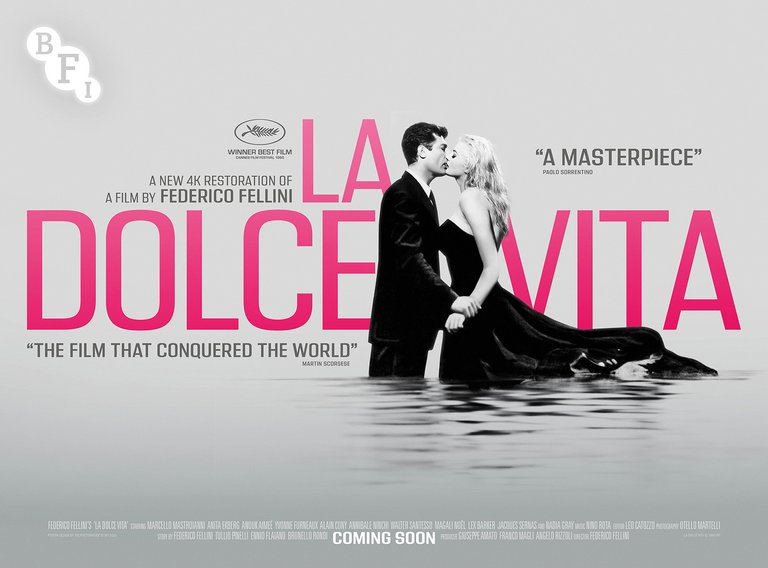
Una de las películas más emblemáticas de la historia del cine
For many years I heard a phrase uttered in Italian that was common in almost any circle in which I interacted. What I didn't know then was that that phrase was also the title of a famous film from the sixties and what many consider one of the best films in the history of cinema. This is La Dolce Vita by the great Federico Fellini.
Durante muchos años escuché una frase pronunciada en italiano que era común casi en cualquier círculo en el que me relacionara. Lo que no sabía entonces era que esa frase era también el título de una famosa película de los años sesenta y la que muchos consideran una de las mejores películas de la historia del cine. Se trata de La Dolce Vita del gran Federico Fellini.
The film focuses on Marcello Rubini (played by actor Marcello Mastroianni) a journalist who lives in Rome and who is dedicated to following the events attended by the celebrities of the time, or the most striking figures of the city's elite. He has dedicated himself to that for years, which is why he has contacts and many acquaintances inside and outside the media. At the beginning we see him go from one party to another, from one bar to another, and - something that will mark the entire film - from one woman to another. The first of them we see appear is Maddalena (Anouk Aimée), a woman who already knows him and with whom he leaves a party to end up at the apartment of a prostitute where they - Maddalena and Marcello, not the other woman - spend the night. We think that Rubini must be a womanizer and the judgment is confirmed when we meet Emma (Yvonne Furneaux), Marcello's partner, who lives full of jealousy, frustrations and insecurities, largely thanks to Marcello's profession and his practice, since he spends his time surrounded by beautiful women and good fortune. And given what we just saw happened with Maddalena, Emma is right to be jealous. Now, from there, the journalist will meet, recognize, meet and reunite again with different women throughout the almost three hours of film in an episodic story that mixes drama, comedy and philosophy.
La película se centra en Marcello Rubini (interpretado por el actor Marcello Mastroianni) un periodista que vive en Roma y que se dedica a seguir los eventos a los que asisten las celebridades de la época, o las figuras más llamativas de la élite de la ciudad. Se ha dedicado a eso durante años, razón por la cual tiene contactos y muchos conocidos dentro y fuera de los medios. Al inicio lo vemos ir de una fiesta a otra, de una barra a otra, y - algo que marcará toda la película - de una mujer a otra. La primera de ellas que vemos aparecer es Maddalena (Anouk Aimée), una mujer que ya lo conoce y con quien se va de una fiesta para ir a parar al departamento de una prostituta en donde ellos - Maddalena y Marcello, no la otra mujer - pasan la noche. Pensamos que Rubini debe ser un mujeriego y el juicio se confirma cuando conocemos a Emma (Yvonne Furneaux) la pareja de Marcello, quien vive cargada de celos, frustraciones e inseguridades, en gran parte gracias a la profesión de Marcello y a su ejercicio, pues él se la pasa rodeado de mujeres hermosas y de buena fortuna. Y dado lo que acabamos de ver que ocurrió con Maddalena, Emma tiene razón de sentir celos. Ahora bien, a partir de allí, el periodista irá conociendo, reconociendo, encontrándose y reencontrándose con diferentes mujeres a lo largo de las casi tres horas de película en una historia episódica que mezcla drama, comedia y filosofía.

Because of the posters I had seen somewhere and some stills, I thought that La Dolce Vita was a classic love story between a man and a woman, but those scenes I had seen focus on one of the women that Marcello knows, Sylvia (Anita Ekberg), a famous film diva, Swedish, slender, easygoing, happy and fun who arrives in Rome to the delight of all the media and who, of course, ends up having an extramarital affair with Marcello .
Debido a los posters que había visto en alguna parte y a algunos fotogramas, pensé que La Dolce Vita era una historia de amor clásica entre un hombre y una mujer, pero esas escenas que había visto se centran en una de las mujeres que Marcello conoce, Sylvia (Anita Ekberg), una famosa diva del cine, sueca, esbelta, desenvuelta, alegre y divertida que llega a Roma para deleite de todos los medios y que, cómo no, termina teniendo una aventura extra matrimonial con Marcello.
I confess that the film has excellent direction and beautiful black and white photography, as well as interesting, memorable sequences and many phrases that stay in your head, like the one Marcello says to Sylvia: "You are everything... everything! You are the first woman on the first day of creation. You are mother, sister, lover, friend, angel, demon, earth, home"; or one from Sylvia herself: "I like many things. But there are three things I like the most: love, love and love"; or one that Laura tells Marcello: "Stay free, available, like me. Never get married. Never choose. Even in love, it is better to be chosen". Phrases like that or scenes like that of the Trevi Fountain (presentation image of this post) have helped to mythologize this film in the collective imagination. La Dolce Vita also deals with interesting topics, philosophical dilemmas, love, sex, suicide, pleasure, life, death, infidelity, freedom, literature, the supernatural, it touches on religious themes with a certain freshness, in fact the Vatican newspaper classified it as obscene; It shows the invasiveness of the media (paparazzi), the decadence of an elitist, hedonistic and perhaps empty society, all of that adds up, but I felt it was very episodic, as if each day (within the chronology of the film) was a different story with few common threads and few anchor points beyond its protagonist.
Confieso que la película tiene una excelente dirección y una fotografía hermosa en blanco y negro, además de secuencias interesantes, memorables y muchas frases que se te quedan en la cabeza, como la que le dice Marcello a Sylvia: "Eres todo... ¡todo! Eres la primera mujer en el primer día de la creación. Eres madre, hermana, amante, amiga, ángel, demonio, tierra, hogar"; o una de la propia Sylvia: "Me gustan muchas cosas. Pero hay tres cosas que me gustan más: amor, amor y amor"; o una que le dice Laura a Marcello: "Mantente libre, disponible, como yo. Nunca te cases. Nunca elijas. Incluso en el amor, es mejor ser elegido". Frases como esa o escenas como la de la Fontana di Trevi (imagen de presentación de este post) han ayudado a mitificar esta película en el imaginario colectivo. La Dolce Vita trata temas interesantes también, dilemas filosóficos, el amor, el sexo, el suicidio, el placer, la vida, la muerte, la infidelidad, la libertad, la literatura, lo sobrenatural, toca temas religiosos con cierta frescura, de hecho el periódico del Vaticano la catalogó de obscena; muestra lo invasivo de los medios (paparazzis), la decadencia de una sociedad elitista, hedonista y quizás vacía, todo eso suma, pero la sentí muy episódica, como si cada día (dentro de la cronología de la cinta) fuese una historia diferente con pocos hilos conductores y pocos puntos de anclaje más allá de su protagonista.
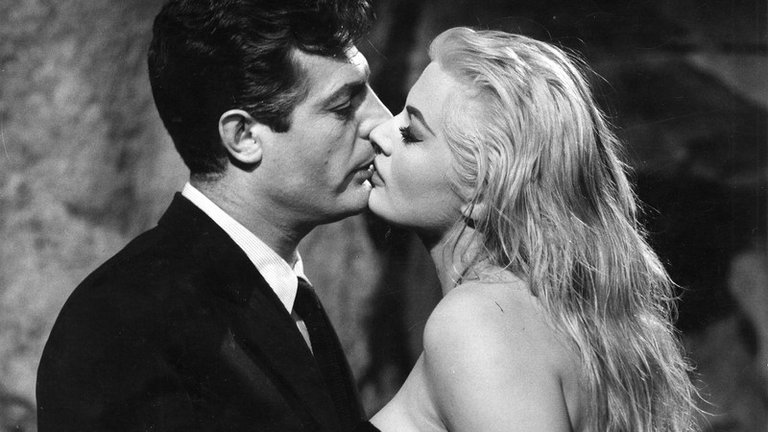
I think that was the main reason that led me to get distracted a couple of times while watching the movie. With shame I confess that I was on the verge of falling asleep while watching it, something that had not happened to me with a film in a long time (perhaps I was more tired than I thought) but I feel that this time Fellini did not manage to captivate me as he did with his 8 1/2.
Creo que esa fue la razón principal que me llevó a distraerme un par de veces mientras veía la película. Con vergüenza confieso que estuve a punto de quedarme dormido mientras la veía, algo que no me ocurría con una película hacía mucho tiempo (quizás estaba más cansado de lo que pensaba) pero siento que esta vez Fellini no logró cautivarme como sí lo hizo con su 8 1/2.
The performances in La Dolce Vita are very good. Mastroianni, who also stars in that other Fellini film that I already mentioned (and whom I have not yet been able to see playing Pereira, that memorable character, in the film adaptation that Roberto Faenza made in 1996 of Antonio Tabbuchi's novel) is a very good actor and is charming and seductive with each of the women he meets. Maddalena, Emma, Fanny, Sylvia, Laura, Paola, all are seduced by this journalist and aspiring writer who at times looks very similar to the film director that Mastroianni plays in 8 1/2. Winner of the Palme d'Or at Cannes, the Oscar for Best Costume Design and other awards and nominations, La Dolce Vita is considered by many to be Federico Fellini's best film, above La Strada and Amarcord, two movies I haven't seen yet. Maybe I had very high expectations, because I love black and white cinema, because this is a classic, because I loved 8 1/2, but my experience with this emblematic film was not enough for me. I think that in the not too distant future I will give this story a new chance and watch it when I'm more rested. Who of you know this director's work? What is your favorite Fellini film? I read you in the comments.
Las actuaciones en La Dolce Vita son muy buenas. Mastroianni, quien también protagoniza esa otra película de Fellini que ya nombré (y a quien no he podido ver aún encarnando a Pereira, ese memorable personaje, en la adaptación cinematográfica que hizo Roberto Faenza en 1996 de la novela de Antonio Tabbuchi) es un muy buen actor y resulta encantador y seductor con cada una de las mujeres que conoce. Maddalena, Emma, Fanny, Sylvia, Laura, Paola, todas son seducidas por este periodista y aspirante a escritor que por momentos se parece mucho al Director de cine que encarna Mastroianni en 8 1/2. Ganadora de la Palma de Oro en Cannes, del Oscar a Mejor Vestuario y de otros galardones y nominaciones, La Dolce Vita es considerada por muchos como la mejor película de Federico Fellini, por encima de La Strada y Amarcord, dos cintas que aún no he visto. Quizás tenía las expectativas muy altas, porque amo el cine en blanco y negro, porque este es un clásico, porque amé 8 1/2, pero mi experiencia con este emblemático film me supo a poco. Creo que en un futuro no muy lejano le daré una nueva oportunidad a esta historia y la veré cuando está más descansado, ¿quiénes de ustedes conocen el trabajo de este director? ¿cuál es su película favorita de Fellini? Los leo en los comentarios.
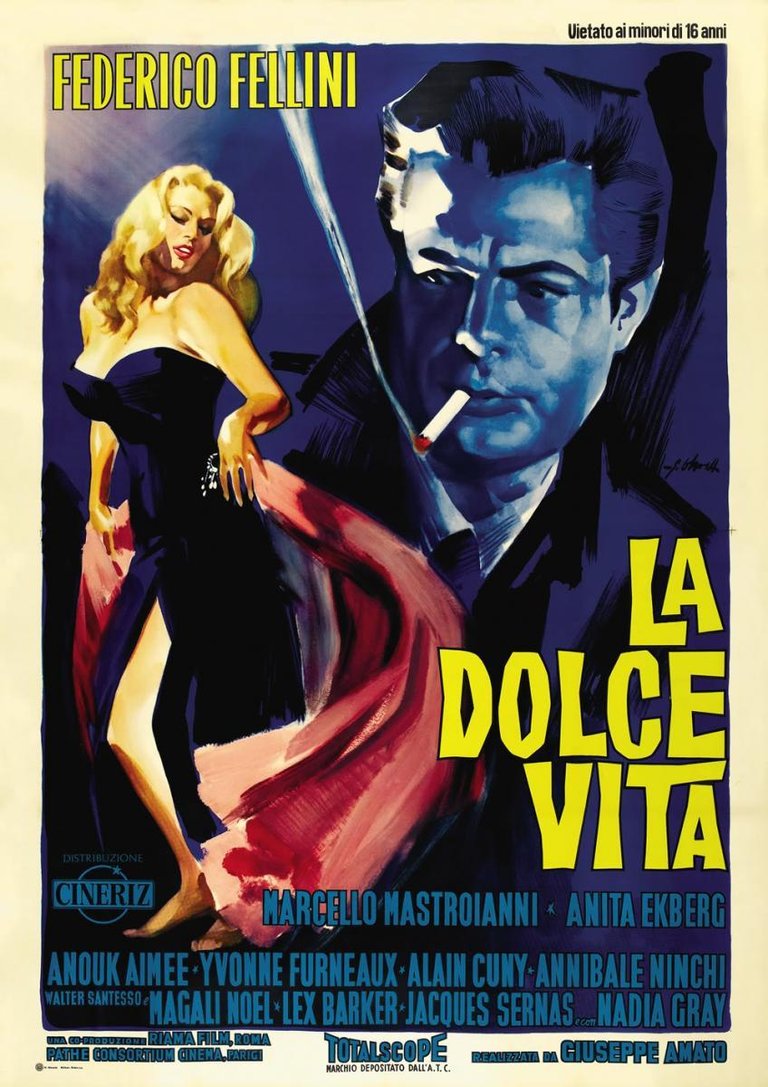

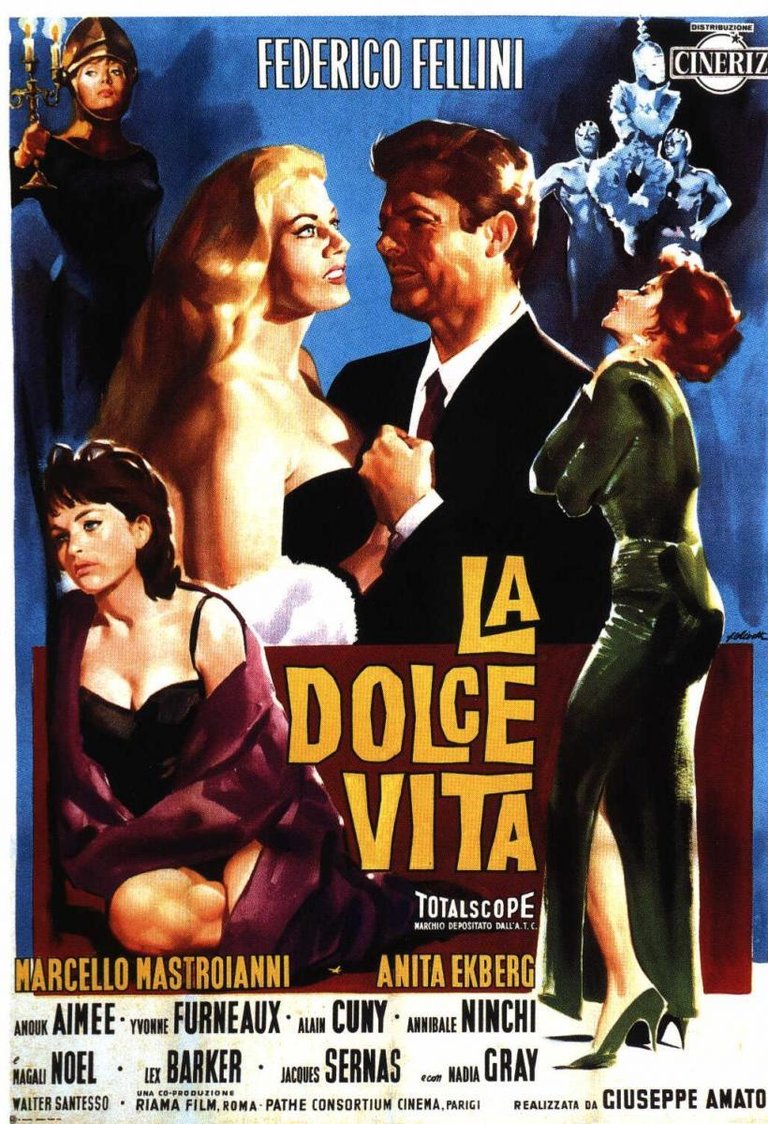
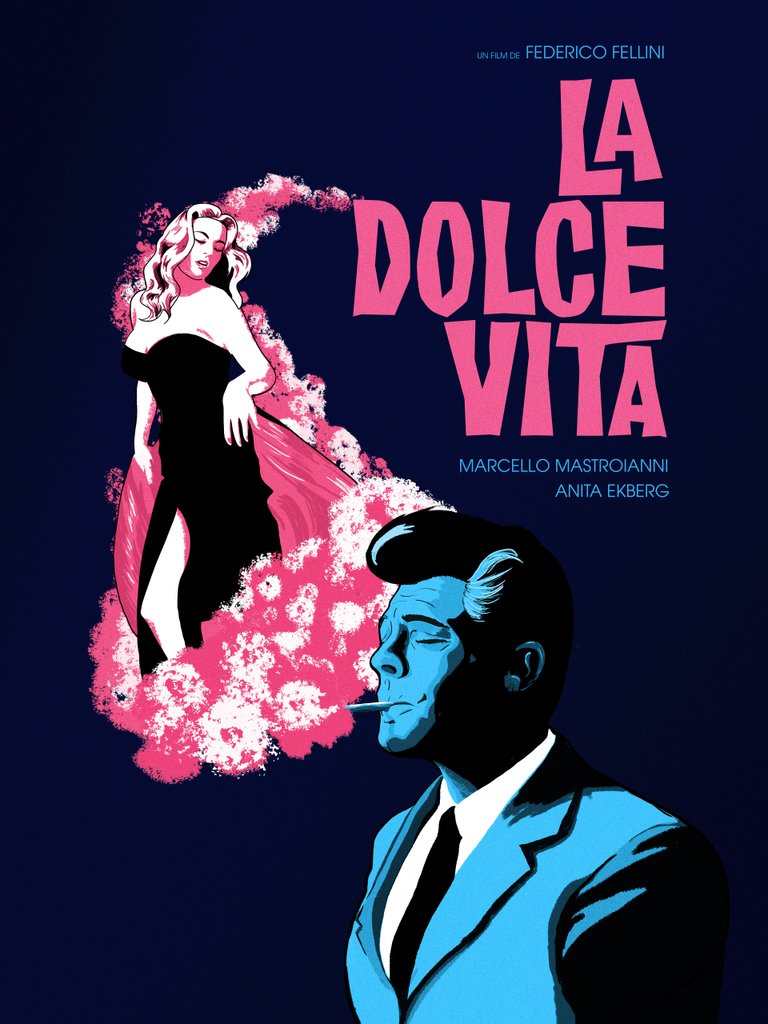
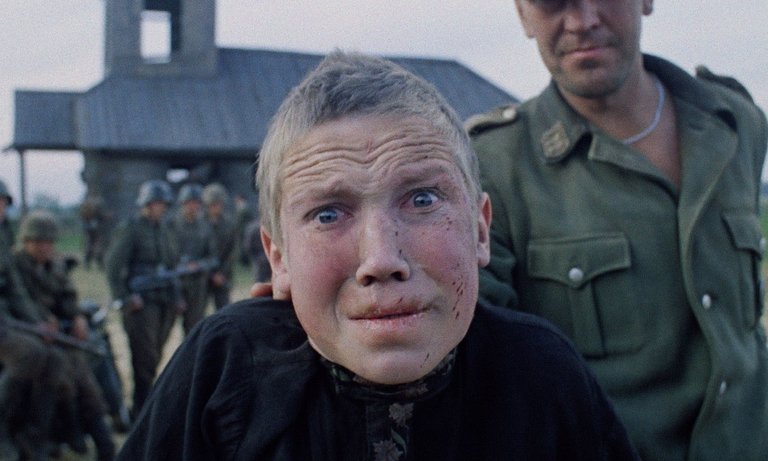

Such an incredibly beautiful film. I didn't want it to end.
Aunque las películas blanco y negro no son lo mío, parece bastante interesante.. los temas que mencionas sobre el suicidio, el amor, etc. Me llaman bastante.. buena reseña 👋🏻
Oye por un momento pensé que era una película actual ya que el maquillaje de la actriz es bastante moderno 🤯🤯